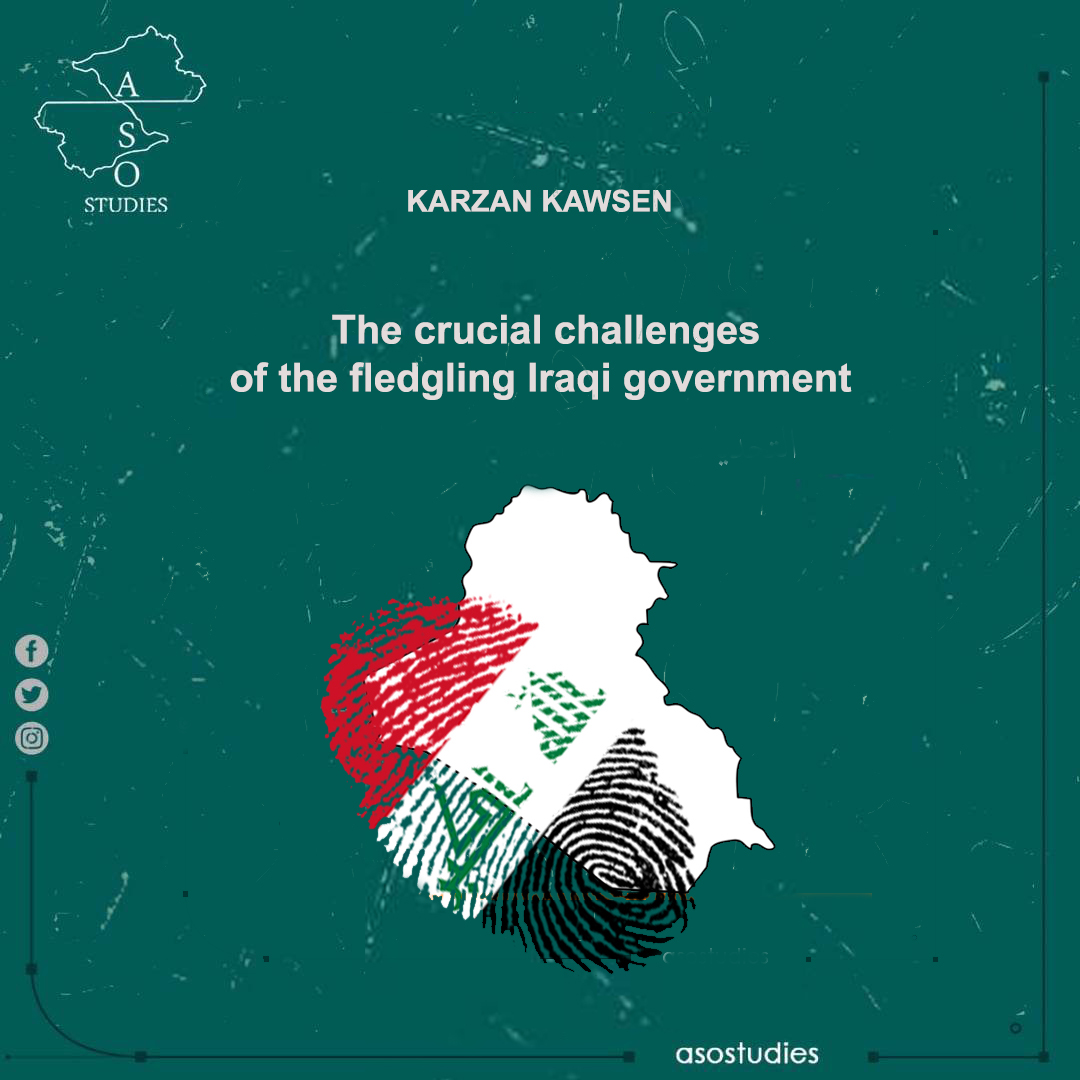The crucial challenges of the fledgling Iraqi government
Karzan KAWSEN
Ahead of establishing the present Iraqi government, Iraq was on the brink of the imminent civil war, which have been raged by the ongoing struggle between the belligerents as the time of the preparing the third anniversary so-called “Al-Tishreen-yeens” named for the mass protests for the reformist demands at Al-Tahrir square Baghdad-October-2019.
However, the mass protests, this year, have come fairly early, erupting in the last august at the same square in Baghdad building a tremendous momentum for the reformist demands claimed by the Iraqi street and has been supported by Sadrist movement, creating the proper political circumstances that paves the way for greater pressure on the Iraqi authorities than what happened in 2019.
One of the prominent differences that the protests have stormed the key government institutions like (supreme Judiciary council building), and the parliament building of Iraq, besides, containing the popular resentment by demonstrating, therefore, generalizing such mentality across society.
Thus, new forms of demonstrating have emerged in Iraqi street, and became as social likelihood to be the next uprising against the Iraqi government, in case the Iraqi government does not respond to the people’s demand for further services and fight against corruption and nepotism.
Although the new Iraqi cabinet reshuffle is the outcome of the political and different phase in post-Iraqi war 2003. And ironically the current government is considered Shia alliance-installed government “the coordination framework” but people out their faith on it. Prime Minister Mohammed al-Sudani, who is the secretary-general of the "Euphrates” movement, which he founded in 2021. He had essentially defected from the Dawa Party. He was also a former candidate by the same party, for prime minister, but was strongly rejected by the Sadrist movement.
Al-Sudani has established his own political current, following the reform demands called for by the First Tishreen demonstrations of 2019. Analysts believe that the flexibility shown by the Sadrist movement regarding Sudani's candidacy this time is due to the political independence that was reflected in al-Sudani's positions and statements.
However, this does not mean a significant change in the Sadrist movement's position on Sudani, as the movement's leader, Muqtada al-Sadr, described in his latest media interview the Sudanese government as a government of militias. This is a sign of the forces that pushed al-Sudani to be a disputed candidate for prime minister of this government.
The coming days will be a difficult test for the Sudani regime with Sadrist movement and the various social segments of the Iraqi people. This is because the Sadrist movement's attempt to remove the Iraqi government from regional hegemony enjoys popular support on the Iraqi street. In particular, Sadr's desire to free the government from the pro-Iranian Iraqi parties that have allied themselves in the “Coordination Framework”. Sadr tried to establish a parliamentary majority government by allying with small Iraqi parties, but his efforts bore no tangible outcome in the end.
Al-Sadder has made a numerous political maneuvering to obtain a more appropriate candidate among people for forming the government. including his tactical announcement of withdrawal from political life, which did not seem to have made much effect. Most analysts agree that the idea of Sadr's withdrawal from political life is not possible for him, nor can he fail his current constituency, who have placed their hopes for Sadr to remain at the head of this movement.
That makes it possible that Sadr's movement will become the political observer of the performance of the Sudanese government. Sadr will therefore resume his attempts to pressure political forces to perpetuate the idea that there is a better alternative than the ruling Iraqi forces, which have brought the people to worse off for years.
The Iraqi’s Street position against the government is nothing new, however, I add the Sadrist movement's ability to condemn and contain the whole spectrum of the Iraqi society within the demonstrations. In particular, the voices of the middle class and the poor of society have fed up with the corruption of successive Iraqi governments and they are gaining momentum day by day, and constitute a tangible pressure force in the Iraqi street.
Al-Sudanee alleged that he is set to make wide-range reforms and major reform measures and tackle corruption. As his first step in his government's work, al-Sudani has dismissed a number of officials suspected of corruption by embezzling public funds and smuggling oil. He also established other auxiliary committees to the Parliamentary Integrity Committee. These measures may give temporary relief to Iraq's political public. Even if these actions appeared as an attempt to distract attention of the public, it can contribute to strengthening his political stands and shaking negative doubts off.
This successful start for Sudani is only a temporary achievement. In order to consolidate this entitlement, it must translate its promises into reality in the near future. This is in order to calm public discontent, which will remain like a ticking bomb, capable of bursting up at any moment.
on the other hand, if he reclaimed the power of the governments that preceded him. Things will soon get worse than they were. This is for a very explicit reason: this time, the demands of the demonstrators are no longer the same as those claimed by the Iraqi political and religious forces and currents, which used to use people's discontent and exploit it for their interests.
There is silence about the possibility of early elections in Iraq. However, this does not reflect the absence of this idea. In the context of political competition, there are strong stand and handshake that the Sudanese Government will complete its functions for the remainder of the current electoral cycle. However, the government’s survival depends on the performance of its sensitive tasks at this critical time. Therefore, pressure from the Iraqi street could lead political forces to resort to the idea of early elections.
Iraq's increased openness to its regional and international environment has fueled political awareness in the Iraqi street. Indigenous groups are slowly moving away from extremist sectarian affiliations. Public rejection of regional wills has also escalated. National demands took precedence over partisanship, and slogans emerged that demanded national identity, and the adoption of the homeland as a basic source of the Iraqi civil identity, the strength of the state, and to carry out reforms and get the country out of its current dire situation.
Therefore, as soon as a name is put forward by assuming the presidency of the Iraqi government, people rush to search for the nature of the political forces that support it, as well as its political and social legacy, and to what extent it was far from suspicions of corruption.
In conclusion, we can say that it is no longer possible today for Iraqi political forces to exploit the capabilities of the state and its institutions to consolidate their narrow partisan interests. Or it is just a “functional” force in the service of regional states. Therefore, these forces must be well aware of the strength of the Iraqi street, which, despite knowing that it will be subjected to various forms of repression, goes out to demonstrate and continues to organize massive sit-ins against these forces.
Iraqis have endured suffering of the past governance experiences. Although the pressure forces on the Iraqi street did not bring about major political transformations, they began to influence the balance of power. Popular discontent extends from far to far from the country. We believe that Iraqi leaders can read these challenges and respond to them in the best way, lest recent history repeat the same scene.

